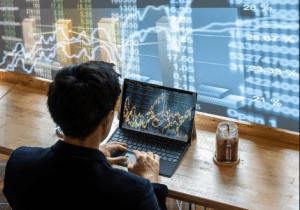 A day trader buys and sells financial instruments multiple times within the same trading day, holding onto them for no more than a few hours. FIRNA and NYSE refer to them as “Pattern Day Traders” and classify them as anyone who successfully executes more than four trades a day for five days or invests in a firm that is capable of making this number of trades.
A day trader buys and sells financial instruments multiple times within the same trading day, holding onto them for no more than a few hours. FIRNA and NYSE refer to them as “Pattern Day Traders” and classify them as anyone who successfully executes more than four trades a day for five days or invests in a firm that is capable of making this number of trades.
The primary difference between pure day traders, swing, and position trades is the fact that day traders always end the day in a cash position, no overnight trades. And while there is no limit to the types of securities they can trade, most of their activities are confined to the highly liquid stock and currency markets.
The highly accommodative nature of the securities market makes it possible for virtually anyone with access to a computer and fast internet to join in as a day trader. However, only a small percentage of all these entrants turn the trade into a profitable income generating stream. So what does it take to become a professional day trader? Find out everything you need to know in this guide.
Here are nine steps on how to go about it
1. Understand the markets and financial instruments
 A solid and broad understanding of the industry players and the financial instruments traded here form the foundation of every successful day trading career. Start by mastering such basic details about the market as its different players, the trading time, fees, commissions and exploring trading platforms. This can then stretch to cover such aspects as economic calendars for the different markets and economies and how their interactions affect the price of a financial instrument as well as your ultimate profitability.
A solid and broad understanding of the industry players and the financial instruments traded here form the foundation of every successful day trading career. Start by mastering such basic details about the market as its different players, the trading time, fees, commissions and exploring trading platforms. This can then stretch to cover such aspects as economic calendars for the different markets and economies and how their interactions affect the price of a financial instrument as well as your ultimate profitability.
Do you wish to trade stock, futures, forex, or commodities? Note that every aspiring Day Trader must have a foolproof understanding of the characteristics of different securities, their trading requirements, and most suitable trading strategy.
Without a proper understanding of how such industry players as a hedge and mutual funds as well as institutional traders like banks operate, you are bound to make a costly mistake.
2. Have sufficient trading capital

In such a case, you need sufficient capital to cushion you from these losses and enough to help you bounce back and reclaim the lost trades. Some market operative like brokers will often demand a minimum deposit or trading balance for the different types of accounts.
NYSE and SEC trading policies, on the other hand, recommend that a day trader, whether professional or operating an individual account starts with $25,000 especially if they hope to engage in Leverage and margin trading. Keep in mind that the higher your trading account operating capital, the lower your dependency on leverage and margin trading and in effect low-risk.
3. Self-assess and identify your strengths and limitations
Are you ready to start working long hours analyzing the markets, gathering as many skills and knowledge about different industry players and financial instruments? How tolerant are you to risks and can you handle the never-ending pressure that comes with day trading?
You ask the self-assessment questions and answers them honestly as they help you gauge your preparedness towards starting a day trading career. Remember that while you don’t need skills to open a forex or stock trading account with a retail broker, you need expert analysis and money management skills if you are to protect your investments and make tangible returns from this account.
Above all, you need to be mentally prepared on how to deal with both losses and risks. Consider joining a social trading platform that offers guidance and even mentorship to novice traders on how to handle such complexities of day trading as risks and losses.
4. Decide on the securities to trade
When trading forex with an online retail broker like Plus500, you only need relatively low capital investment, about $100 for the initial deposit, whose impact on any trade you make can be amplified exponentially with leverage offered by the broker. Some of the fees include maximum 3 pips spread for the major currency and a withdrawal fee over $25 for transactions exceeding $50.
Trading stocks at the NYSE on the other hand, you will need an accredited investor certificate and a significant capital investment considering the fact that the securities exchange doesn’t support leverage and margin trading. Fees here include a stamp duty tax for every transaction and additional broker fee.
Ideally, liquidating stocks in an exchange is more complicated than cashing out your gains on investment with a forex or CFDs broker. When deciding on the financial instrument to focus on, take time to explore all factors acting on the trading instrument and how they impact its price and volatility. It is imperative that every aspiring day trader strives to achieve full familiarity with the financial instrument of their choice.
5. Decide on a broker
The choice of your retail broker plays a key role not just in determining the profitability of your trade but also the success of your career as a trader. When searching for the best broker, it is therefore imperative that you only settle with one that guarantees maximum returns on your investment while helping you shape your trading career.
Some of the indicators of a good broker include relatively low fee and commissions, a wide variety of financial securities, dedicated customer support team, and provision of educational materials as well as individualized training sessions for both novice and slightly experienced traders.
Additional factors to put into consideration when vetting a broker include the order execution speed, the number, and features of the trading accounts hosted on their platform and whether they support such emerging trends in the industry as expert advisor and social trading. Some brokers allow users to speed up the learning process by following experienced traders and copying their trade settings.
6. Design or borrow a trading strategy
Your preferred online retail broker should also have the demo account feature. This comes in handy in advancing your day trading skills by offering you a risk-free environment on which you can try and test out different trading strategies.
If you are a beginner you will probably have to borrow strategies online. Experienced traders, on the other hand, can use the demo trading environment to develop own strategies and perfect them using live market data.
7. Identify and integrate technologies that give you a trading advantage
Learning how to become a day trader is more than just the mastery of how to enter and exit trades. It involves deep analyses and extensive research of the different trading technologies And figuring out how they may be used to give you a competitive edge in the realization of more returns on investment as well as speeding up your process of becoming a professional trader.
For instance, if you are scalping forex and stock markets, it would be advisable that you consider using such advanced tools as automated trading algorithms as well as ensure you have all the necessary apps that will make your trading easier.
More importantly, integrate the professional analytic tools into your trading strategy, both the free and premium versions. In most cases, your broker will allow for the customization of their market and price chart. Take advantage of this to make them as user-friendly as possible.
8. Start small
When you have sufficient disposable income to trade, it may be tempting to engage the market aggressively. It is, however, advisable that you trend moderately when making your first trades especially if you are a beginner trying out a new strategy, or just made significant adjustments to your already effective strategy. Consider starting small and testing your grasp of the trade and the effectiveness of your new strategy using small investments and without overtrading.
You can then expand the trading amount allocated to trade as well as the number of trades executed on a daily basis after self-analysis and strategy review confirms your understanding of the market. Remember that the market stacks numerous odds against an individual Trader making it easier to lose money in the industry than it is to gain some. At this point, it is also advisable that you minimize the use of leverage and margin trading considering that losses emanating from leveraged trades have the potential of wiping your account.
9. Master emotions and manage trading risks

Understand that it is okay to lose just as it is okay to win. Like any other business with costs and expenses, these losses are like the costs to your forex trading business. You should embrace them but strive to cut them down.
Significant losses can also be associated with the implementation of risk management control. For instance, have you been using the stop-loss order in all your trades? How often and to what extent do you use leveraged funds and have you considered hedging? Could you be overtrading? Are you observing a healthy risk reward ratio?
How to speed up the learning process for a day trader
Find a mentor or private trainer:
The financial markets are quite complicated. Self-training about the different trading styles and strategies, learning all about the industry players, and the countless financial instruments can be quite overwhelming. Finding a mentor or a private trainer, for free or at a fee goes a long way in helping the day trading enthusiast cut down on the time it takes to master the day trading practice. Different brokers offer private training to both beginners and slightly experienced Traders at a fee.
Practice a lot in a demo account
There is a reason even the most experienced Traders insist on maintaining demo accounts. They understand that it is only through regular practice that they can master their trading style and improve the effectiveness of their strategy. You also will probably be using an automated Trader and there is no better way of testing its effectiveness than in demo account environment.
Enroll for a free or premium training course
Have you considered enrolling for a trading course? Some brokers provide educational materials, both text and Audio Visual, with the aim of helping all the traders within their platform to master the trade. Paying attention to this information goes a long way in speeding up your mastery of day trading. You can also consider the free online forex beginner guides that help you grasp the high-level outlay of the market.
Work with established strategies

You only have to get in touch with a pro trader that is willing to share their trade settings for free or at a fee. It is, however, advisable that you practice caution when buying or borrowing a strategy and vet the repute and reliability of the expert trader before risking your investment with it. You can also consider testing it and its effectiveness in the risk-free demo trading account.
Factors to consider before learning how to day trade
Disposable income
The level of capital invested in a trading account doesn’t just impact how much you make from your trades but also affects your day trading learning process. For instance, if you invest little amounts, you will be forced to heavily rely on leverage when making trades, thereby increasing your chances of blowing the account and discontinuing your lessons. Huge amounts, on the other hand, can stand a streak of losses, buying you enough time to identify what you may be doing wrong and make necessary corrections.
Time at hand
Do you wish to trade full time or part-time? Keep in mind that while day trading may be considered a semi-passive income generating opportunity, learning how to trade is quite demanding and a more hands-on affair. How fast you perfect your day trading skills, therefore, depend on how much time you allocate your to training and demo account practice.
Commitment to the trade
Day trading isn’t for the faint hearted as it takes a huge toll on your finances and state of mind. You will be under constant pressure analyzing the markets and living on the edge as you watch them go against your analyzed predictions. Making it here, therefore, requires total commitment to the trade and emotional preparedness, including the ability to alienate emotions from your analysis and trade execution.
Merits and demerits of day trading
Merits
- Eliminates overnight risks associated with market moves and fees
- Gives trader access to high leverages
- Highly rewarding if you use the correct strategies and risk management tools.
- No need for investor accreditation certificates
- There is no legal requirement regarding the minimum trading amounts.
Demerits
- The cumulative per trade fees and commissions often take a toll on the trader’s net returns.
- The leverage used here often causes more harm than good in the hands of beginners
- Learning how to day trade takes a lot of time and resources in the name of trial and error especially when you don’t have a mentor
Final words
Day trading stocks, forex, commodities, and futures is all encompassing and not for the faint-hearted. It involves risking your invested amounts time and gain while demanding that you maintain objectivity, regardless of the number of losses you might have suffered in the previous trades. The industry players have, however, come together to force workarounds for the different aspects of the trade like making it possible for new traders to borrow effective trading strategies from their more experienced counterparts.
There are also volumes of day trading tutorials available freely on the internet and on your preferred broker’s website. Some like eToro have gone ahead to introduce revolutionary features such as the social trading platform where traders can copy pro trader’s settings and benefit from their mentorship and trading guidance.